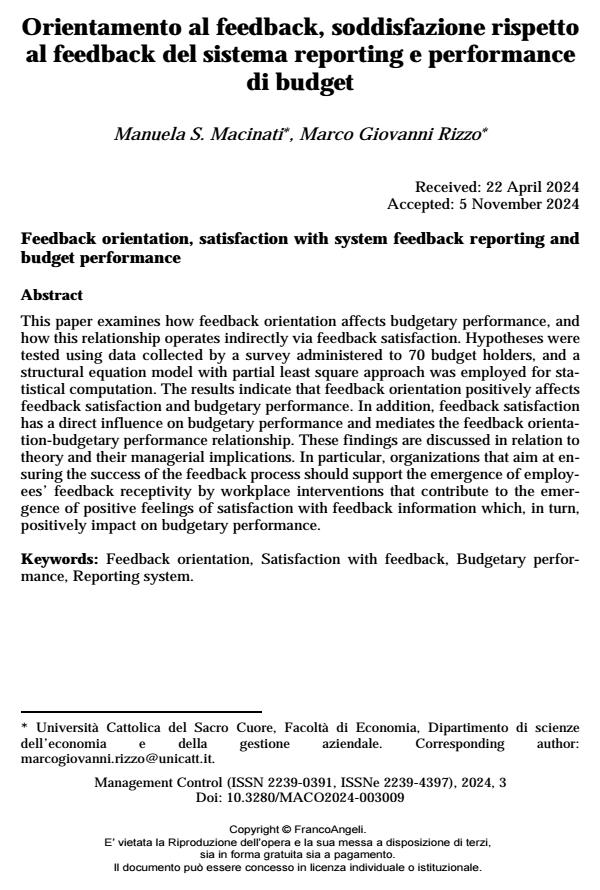Orientamento al feedback, soddisfazione rispetto al feedback del sistema reporting e performance di budget
Titolo Rivista MANAGEMENT CONTROL
Autori/Curatori Manuela S. Macinati, Marco Giovanni Rizzo
Anno di pubblicazione 2024 Fascicolo 2024/3
Lingua Italiano Numero pagine 22 P. 179-200 Dimensione file 132 KB
DOI 10.3280/MACO2024-003009
Il DOI è il codice a barre della proprietà intellettuale: per saperne di più
clicca qui
Qui sotto puoi vedere in anteprima la prima pagina di questo articolo.
Se questo articolo ti interessa, lo puoi acquistare (e scaricare in formato pdf) seguendo le facili indicazioni per acquistare il download credit. Acquista Download Credits per scaricare questo Articolo in formato PDF

FrancoAngeli è membro della Publishers International Linking Association, Inc (PILA)associazione indipendente e non profit per facilitare (attraverso i servizi tecnologici implementati da CrossRef.org) l’accesso degli studiosi ai contenuti digitali nelle pubblicazioni professionali e scientifiche
This paper examines how feedback orientation affects budgetary performance, and how this relationship operates indirectly via feedback satisfaction. Hypothe-ses were tested using data collected by a survey administered to 70 budget holders, and a structural equation model with partial least square approach was employed for statistical computation. The results indicate that feedback orientation positive-ly affects feedback satisfaction and budgetary performance. In addition, feed-back satisfaction has a direct influence on budgetary performance and mediates the feedback orientation-budgetary performance relationship. These findings are discussed in relation to theory and their managerial implications. In particular, or-ganizations that aim at ensuring the success of the feedback process should sup-port the emergence of employees’ feedback receptivity by workplace interventions that contribute to the emergence of positive feelings of satisfaction with feedback information which, in turn, positively impact on budgetary performance.
Parole chiave:Feedback orientation, Satisfaction with feedback, Budgetary perfor-mance, Reporting system.
- Dalla misurazione dell'outcome a quella dell'impact: la Sentiment Analysis a supporto della valutazione della performance delle aziende sanitarie pubbliche Christian Di Falco, Guido Noto, Gustavo Barresi, in MANAGEMENT CONTROL 2/2025 pp.157
DOI: 10.3280/MACO2025-002008
Manuela S. Macinati, Marco Giovanni Rizzo, Orientamento al feedback, soddisfazione rispetto al feedback del sistema reporting e performance di budget in "MANAGEMENT CONTROL" 3/2024, pp 179-200, DOI: 10.3280/MACO2024-003009